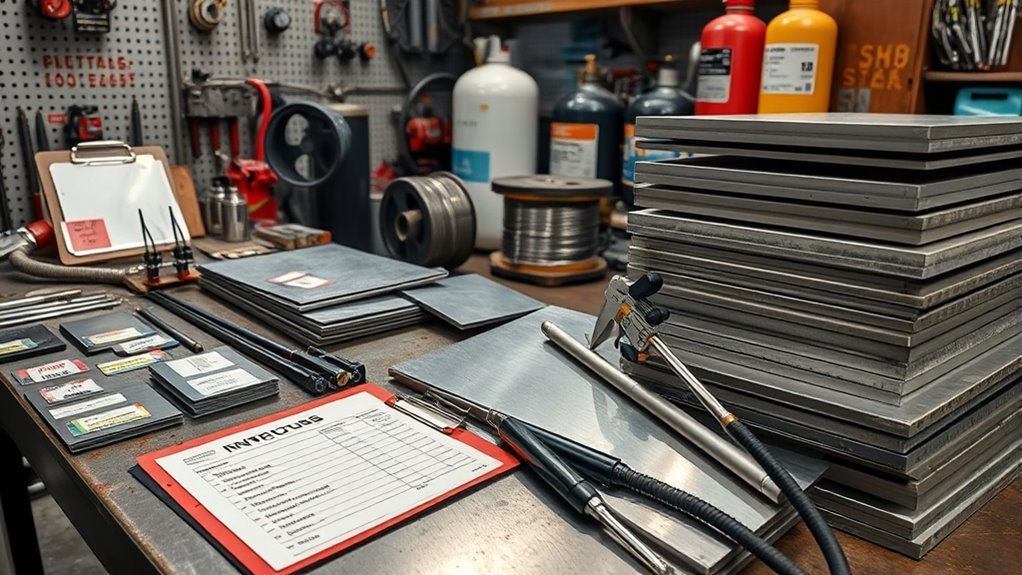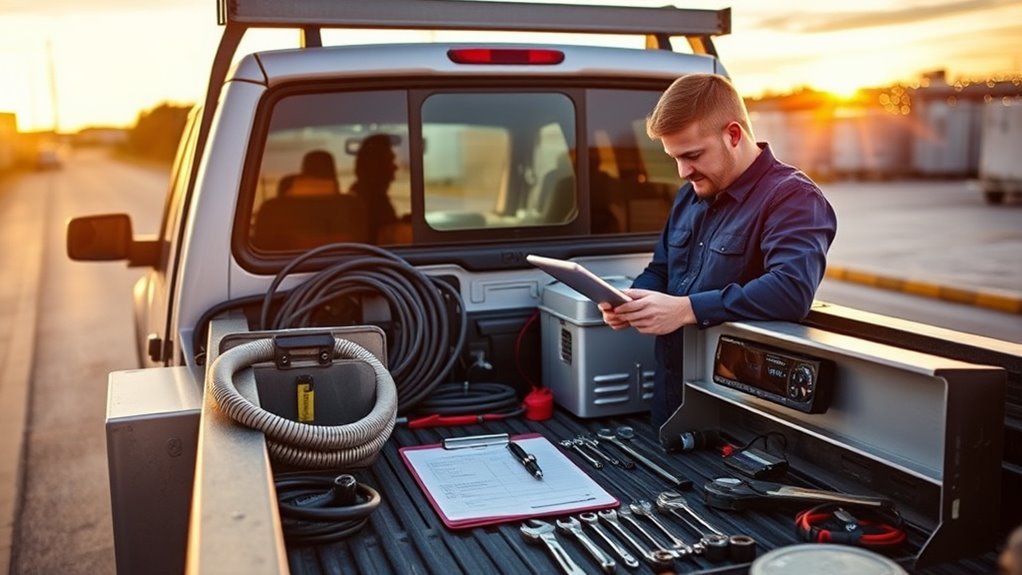You’ll pay a $75 first‑hour mobile minimum (or a $40 small MIG / $75 TIG shop minimum) plus a $60 equipment start‑up and $60/hr machine time; mobile work adds a $60 callout up to 25 miles then $2.30/mi beyond, with mobile hourly and after‑hours rates higher. Materials, metal type, and job complexity affect time and consumables, and fabrication quotes vary by at least $200; continue for the full breakdown of fees, travel, and estimate tips.
Welder Hourly Rates and Minimum Charges

When you hire Thompson Welding Services for mobile work, expect a $75 minimum for the first hour, then hourly charges that vary by welding type; small MIG jobs carry a $40 minimum while TIG starts at $75 due to higher material costs.
You’ll note a $60 flat fee to fire up equipment, then $60 per hour for ongoing machine time; apply the mobile minimum to the first hour, then select rates per technique.
For welding techniques comparison, document MIG versus TIG requirements, tooling, and consumables, then assign the appropriate minimum.
For fabrication, anticipate quotes that differ by at least $200 based on materials and time.
Account for service area limitations when scheduling; mobilization beyond the zone may affect availability and timing.
Factors That Influence Welding Costs

Because several variables affect what you’ll pay, it’s important to break down the cost drivers before you request a quote.
First, identify welding techniques required: MIG for small jobs often starts at $40, TIG carries a $75 minimum due to higher consumable costs, and mobile service has a $75 first-hour baseline.
Next, calculate travel: a $60 callout covers up to 25 miles, then add $2.30 per mile beyond that.
Then assess job complexity and scale: larger, more intricate welds take more time and materials, driving cost variations.
Finally, factor market conditions — seasonal demand and local competition influence pricing decisions.
Use this checklist to get precise estimates and compare quotes methodically.
Materials, Metal Types, and Additional Supplies

Although material choices might seem straightforward, they directly shape both your project cost and the welder’s approach, so you should list required metals and consumables before getting a quote.
Start by specifying metal type, thickness, and quantities; steel is cheapest, while aluminum or stainless can run 1.5–2× higher.
Itemize consumables: flux, wire (a 30‑lb roll ≈ $40), grinding wheels, sanding stones, and sanding paper (about $64/week).
Account for typical unit prices but expect pricing fluctuations—e.g., a 25‑ft 2×6 14‑gauge stick usually $44–$50 but can spike to $125.
Sum material costs, include waste margin, and add any minimum service fee to cover overhead and transport.
Provide this list to your welder for an accurate final estimate.
Mobile and After‑Hours Service Pricing

Having your materials and quantities listed makes it easier to estimate costs for on‑site work, since mobile jobs add specific fees you need to factor in.
You’ll start with a $60 callout fee for mobile service within 25 miles; beyond that, add $2.30 per extra mile. Expect a $75 minimum for the first hour; then bill at $150 per hour for regular mobile work and $180 per hour for after hours pricing.
Callout: $60 within 25 miles (+$2.30/extra mile). $75 first‑hour minimum; $150/hr regular, $180/hr after‑hours.
You should also account for gas and material charges, itemized separately. Communicate scope, access, and timing so invoices match expectations.
- Relief — knowing fixed callout and minimum avoids surprises.
- Control — mileage and hourly rates let you plan budgets.
- Confidence — clear material charges prevent disputes.
How to Get an Accurate Estimate

Want an accurate estimate? Start by compiling complete project details: dimensions, material types, joint designs, and intended use.
Take clear photographs from multiple angles and include them when you request a free estimate. Describe access constraints, required tolerances, and any finish or coating specifications that affect labor and materials.
Ask Thompson Welding Services to confirm estimate accuracy and whether the quote includes travel, setup, and disposal. Remember the $75 minimum for the first hour of mobile welding; clarify whether that applies to your site.
For larger jobs, request line-item estimates showing material costs, labor hours, and contingencies so you can track variances.
Finally, get the estimate in writing and confirm how change orders will be handled to avoid surprises.
Frequently Asked Questions
Do You Offer Discounts for Repeat or Bulk Customers?
Yes — you’ll get discounts: we’ll enroll you in loyalty programs and apply volume pricing for bulk orders; you’ll follow set tiers, submit purchase forecasts, and receive scheduled rebates and progressively deeper discounts as volume thresholds are met.
Is There a Warranty on Welding Repairs and Fabrications?
Yes — you’ll get warranty details and repair guarantees in writing; we’ll outline coverage period, excluded conditions, required maintenance, and claim procedures, and you’ll follow prompt inspection and documentation steps to validate and process any repair warranty claim.
Can You Provide References or Photos of Past Projects?
Like opening a photo album, you’ll get a project portfolio with clear photos and labeled specs; you’ll also see customer testimonials. Contact us, we’ll send organized files, itemized descriptions, dates, materials, and reference contacts.
Do You Accept Credit Cards and Digital Payment Methods?
Yes — you can pay by card, mobile wallet, or bank transfer; we accept major credit cards and digital payment apps. Follow the prompted steps, verify transaction security on our terminal, and keep receipts for your records.
Are Parts and Shipping Included in Quoted Prices?
Yes — quoted prices usually exclude parts and shipping costs; contrast clarity with assumption: you’ll get a detailed estimate listing parts, labor, and shipping, and you’ll confirm charges, timelines, and any surcharges before work proceeds.
Conclusion
When you contact Thompson Welding Services, get a written estimate that breaks down welder hourly rates, minimum charges, material costs, travel or after‑hours fees, and any consumables. Measure and document the job, request weld specs and turnaround time, and ask for itemized adjustments for metal type or mobilization. Remember, “measure twice, cut once”: verifying details up front prevents surprises and guarantees you pay only for the work actually required.


